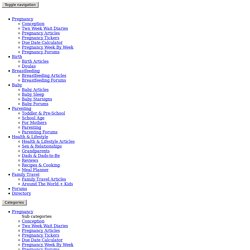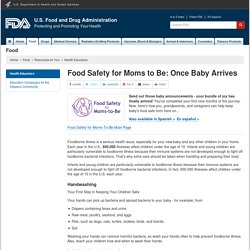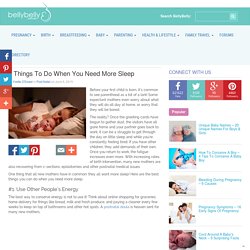

10 Things Lactation Consultants Wish New Mothers Knew. It can take some time to get breastfeeding working well for you and your baby.

It’s a huge learning curve for you and your baby, and not always smooth. As a lactation consultant who professionally supports breastfeeding mothers, I’ve come to learn and understand what can help to make the breastfeeding journey easier, more enjoyable and longer-lasting. Here are 10 things lactation consultants wish new mothers knew to help breastfeeding be a less daunting experience: #1: It Gets Easier Life with a newborn can be an emotional rollercoaster ride. The good news is that things gradually get easier. In the meantime, focus on one day at a time and enjoy all the special moments. #2: Unsettled Periods Are Normal During the early months, it is normal for babies to have one or two unsettled periods every 24 hours. . #3: Cluster Feeding Periods Are Normal Cluster feeding periods are when a breastfed baby has many short feeds close together. Read our article on 7 tips for coping with cluster feeding. Baby Poo! 11 Interesting Facts Parents Should Know.
It’s part of the initiation to becoming a new parent.

Some of us may hate it, some of us may be indifferent to it and maybe some of us even enjoy it?! I’m talking about changing nappies! When I am speaking with parents on the breastfeeding helpline or at private lactation consultancy visits, it usually ends up being the father or other support person (not the mother) who gives me the information about what they’ve been seeing in their baby’s nappies. Why is this so? So, dads and other support people, make sure you read these 11 facts below so you can get the scoop about poop! #1: Your Baby’s First Poo Is Called Meconium The first poo a baby does is black and sticky. Your baby should have at least one poo on day one and two. . #2: Pinkish Stains In Your Baby’s Nappy Is Normal — At First Over the first few days, uric acid crystals in your baby’s wee may leave a rusty, pinkish, orange-red stain on the nappy. #3: By Day Three, Baby Poo Should Be Lighter In Colour #11: Report The Following Unusual Poos.
Health Educators > Food Safety for Moms to Be: Once Baby Arrives. Send out those baby announcements - your bundle of joy has finally arrived!

You've completed your first nine months of the journey. Now, here's how you, grandparents, and caregivers can help keep baby's food safe from here on... Also available in Spanish > En español > Food Safety for Moms-To-Be Main Page Foodborne illness is a serious health issue, especially for your new baby and any other children in your home. Infants and young children are particularly vulnerable to foodborne illness because their immune systems are not developed enough to fight off foodborne bacterial infections. Handwashing. 23 Incredibly Helpful Diagrams For Moms-To-Be. 23 Incredibly Helpful Charts For New Parents. How to Raise a Girl. I’m about to have two little ladies running around my house instead of just one.

(I’m expecting a girl.) And raising a girl is nothing short of a blessing. But sugar and spice and everything nice? Nah. I’ll take a sprinkle of naughty and a hint of “likes to roughhouse.” I’ll throw in a pinch of burn-your-mouth spicy and maybe an occasionally sour too. Because I’ve been thinking a lot about raising girls and about being one too. I’ve been thinking about my own experiences, hardships and hard-won lessons, and what exactly being a woman means to me. So, here we go: a compilation of my memories, self-experiments, personal gender studies, stories and teachings.
How to raise a girl: Let her pick out pink, frilly dresses—and wear them outside to play. Throw the baseball with her in the backyard so that she can break in her new baseball mitt. Be comfortable with her nudity and with your own, so that she can grow to be comfortable in her skin. 6 Things To Do When You Need More Sleep. Before your first child is born, it’s common to see parenthood as a bit of a lark!

Some expectant mothers even worry about what they will do all day at home, or worry that they will be bored. The reality? Once the greeting cards have begun to gather dust, the visitors have all gone home and your partner goes back to work, it can be a struggle to get through the day on little sleep and while you’re constantly feeling tired. If you have other children, they add demands of their own. Once you return to work, the fatigue increases even more. One thing that all new mothers have in common: they all want more sleep! #1: Use Other People’s Energy The best way to conserve energy is not to use it! If services aren’t available locally or your budget is stretched tight, look to your circle of family and friends for support. If people ask what they can buy for presents, a voucher for cleaning services is more valuable gift than a set of baby china.
Packing list for the hospital or birth center.